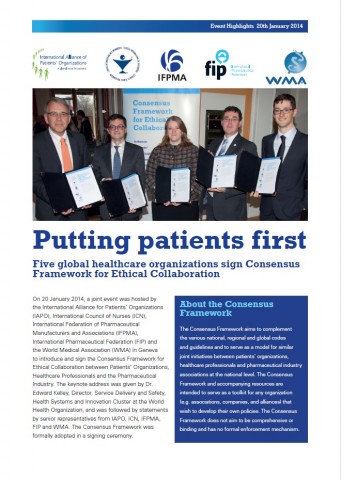
- Trust and respect are essential for advancing healthcare
- Based on shared overarching principles, the Consensus Framework puts patients first, supports ethical research and innovation, ensures independence and ethical conduct, and promotes transparency and accountability
- Highlights best practice for different groups collaborating to advance patient healthcare
Geneva, 13 January 2014 Five global healthcare organizations have established a Consensus Framework for Ethical Collaboration to support partnerships that will aim to deliver greater patient benefits and support high quality patient care. Derived from the individual codes of ethical practice and health policy positions of the five supporting organizations, this framework is based on four overarching principles:
- putting patients first;
- supporting ethical research and innovation;
- ensuring independence and ethical conduct; and
- promoting transparency and accountability.
The five organizations are the International Alliance of Patients’ Organizations (IAPO), International Council of Nurses (ICN), International Federation of Pharmaceutical Manufacturers and Associations (IFPMA), International Pharmaceutical Federation (FIP), and the World Medical Association (WMA).
Advancing medical knowledge and improving health depend on regular information-sharing interactions between all partners. While individual codes of practice govern the activities of each group, this broad-based consensus framework applies across much of the healthcare community to include interactions involving patients, nurses, pharmacists, doctors, and the healthcare industry.
“Ensuring ethical conduct, transparency and accountability are key in the development and testing of medicines and other health technologies,” said Marie-Paule Kieny, Assistant Director-General for Health Systems and Innovation at the World Health Organization. “We encourage all organizations involved to examine ways to develop monitoring mechanisms that can support these principles.”
Comments about the Consensus Framework
IAPO: Ensure Independence and Ethical Conduct
“Because navigating the healthcare system can be very challenging for patients, they need to trust that the care they receive is based on accurate information,” said Joanna Groves, Chief Executive Officer at the International Alliance of Patients’ Organizations.” Following the principles outlined in this Framework will help ensure high quality patient care.”
ICN: Promote Transparency & Accountability
“Core to the Consensus Framework is the transparency and accountability of our work,” said David Benton, Chief Executive Officer of the International Council of Nurses. “By signing this document, each organisation commits to open, transparent and informed decision-making and action, resulting in clear accountability in our actions.”
IFPMA: Facilitate Collaboration and Trust through Establishing the Framework
“As developed and developing economies strive to address pressing health challenges in a complex and fast-evolving healthcare environment, collaboration and trust between all partners are essential,” said Russell Williams, Chair of the IFPMA Code Compliance Network (CCN) and President at Canada’s Research-Based Pharmaceutical Companies (Rx&D). “This Framework confirms shared ethical principles of our organizations to the broader healthcare community.”
FIP: Put Patients First
“More than ever, healthcare delivery requires multiple interactions between patients, healthcare professionals, industry and other stakeholders,” said Luc Besançon, General Secretary and CEO of the International Pharmaceutical Federation (FIP). “All organizations signing this consensus framework have reaffirmed today that putting patients first is of prime importance, so that all interactions have one common objective and truly benefit the ones that really matter: the patients”.
WMA: Support Ethical Research & Innovation
“Heath Care requires trust and confidence in what health professionals do for their patients. Providing care is a team effort nowadays and our cooperation has to be transparent, accountable and professional.“ said Otmar Kloiber, Secretary General of the World Medical Association. “However Caring and Ethics are not enough: Medicine needs scientific research to develop and to provide honest defensible answers to many open questions in healing diseases and protecting our health. Making the cooperation possible for ethical research and innovation is one of the aims of the consensus framework.”
Links:
The Consensus Framework for Ethical Collaboration between Patients’ Organizations, Healthcare Professionals and the Pharmaceutical Industry is accessible at [http://www.ifpma.org/fileadmin/content/Publication/2014/Consensus_Framework-vF.pdf].
The codes of practice for each supporting organization are available at IAPO, ICN, IFPMA, FIP, WMA.
About IAPO:
IAPO is the only global alliance representing patients of all nationalities across all disease areas and promoting patient-centred healthcare worldwide. Our members are patients’ organizations working at the local, national, regional and international levels to represent and support patients, their families and carers. IAPO has over 200 members which span over 60 countries and 60 disease areas and through its membership represents an estimated 365 million patients worldwide.
About ICN:
The International Council of Nurses (ICN) is a federation of more than 130 national nurses associations representing the millions of nurses worldwide. Operated by nurses and leading nursing internationally, ICN works to ensure quality care for all and sound health policies globally.
About FIP:
The International Pharmaceutical Federation (FIP) is the global federation of national associations of pharmacists and pharmaceutical scientists and is in official relations with the World Health Organization (WHO).Through its 126 Member Organisations FIP represents and serves more than three million practitioners and scientists around the world. Its mission is to improve global health by advancing pharmacy practice and science to enable better discovery, development, access to and safe use of appropriate, cost-effective, quality medicines worldwide.
About IFPMA:
IFPMA represents the research-based pharmaceutical companies and associations across the globe. The research-based pharmaceutical industry’s 1.3 million employees research, develop and provide medicines and vaccines that improve the life of patients worldwide. Based in Geneva, IFPMA has official relations with the United Nations and contributes industry expertise to help the global health community find solutions that improve global health.
About WMA:
The World Medical Association (WMA) is an international organization representing physicians. The organization was created to ensure the independence of physicians, and to work for the highest possible standards of ethical behaviour and care by physicians, at all times. The purpose of the WMA is to serve humanity by endeavoring to achieve the highest international standards in Medical Education, Medical Science, Medical Art and Medical Ethics, and Health Care for all people in the world.









